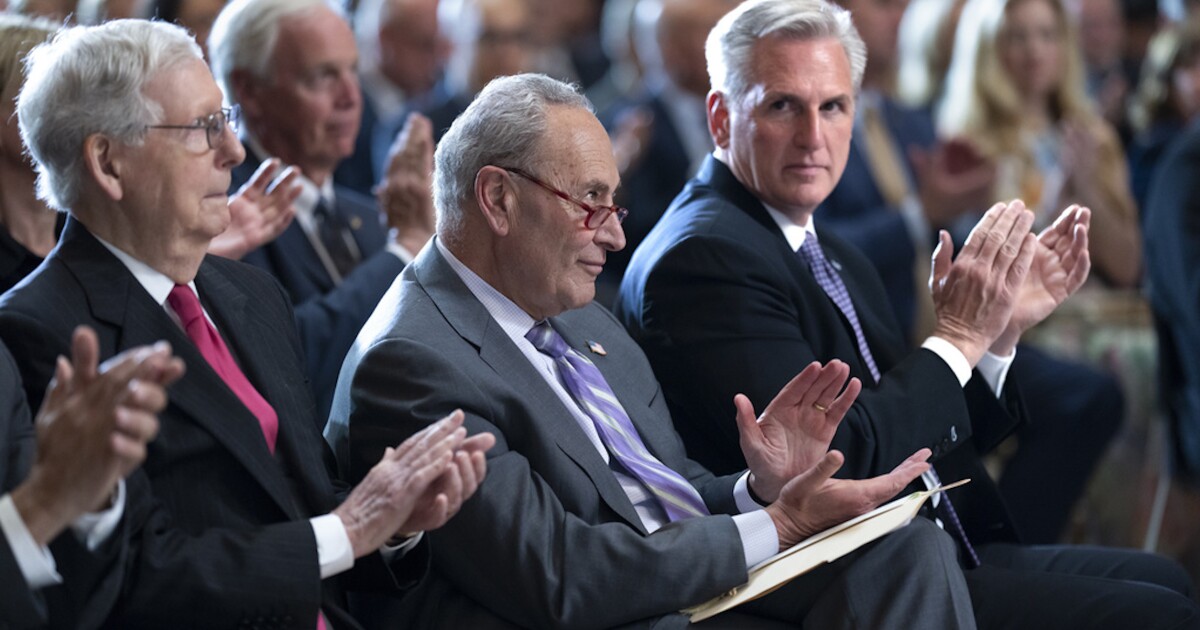

President Joe Biden and House Speaker Kevin McCarthy (R-CA) accomplished the difficult task of reaching a tentative agreement to avert a debt default over the weekend. Now comes a much harder challenge: selling the deal to their respective sides.
Negotiators reached a tentative agreement on Saturday evening that would raise the debt ceiling for two years, roll back non-defense discretionary spending to Fiscal Year 2022 levels, and cap top-line federal spending to one-percent annual growth over the next six years. The deal was swiftly criticized by progressives and hard-line conservatives, with the former claiming the cuts were too severe while the latter argues the cuts were insufficient.
GOP NEGOTIATORS STRIKE TENTATIVE DEBT CEILING DEAL WITH WHITE HOUSE
The debt ceiling, or the highest amount the federal government can borrow, will either need to be raised or abolished sometime next month to avert a default. Economists have long warned that such a default would wreak havoc on the economy. Treasury Secretary Janet Yellen said the United States will be unable to pay its bills by June 5.
McCarthy needs 218 votes to pass the bill, dubbed the “Fiscal Responsibility Act,” through the House. Republicans hold a 222-213 majority in the chamber, meaning he can only afford four defections. Given that far more than four GOP lawmakers have already voiced their opposition to the deal, he’ll need House Minority Leader Hakeem Jeffries (D-NY) to whip enough Democratic votes to push the bill across the finish line.
“Yes, they have to worry,” Rep. Pramila Jayapal (D-WA), who chairs the House Progressive Caucus, told CNN on Sunday when asked about Jeffries and Democratic leadership being able to whip votes from her members.
Rep. Jim Himes (D-CT), the top Democrat on the powerful House Intelligence Committee, did not shy away from airing his grievances with the bill on Sunday, noting to Fox News how “None of the things in the bill are Democratic priorities.” As for whether the package could pass, Himes told the network that, “In the service of actually not destroying the economy this week, [it] may get Democratic votes,” though he would not say with certainty that the bill would survive a House vote.
“It’s not done yet,” he added. “And all you need to do is check the social media of the Freedom Caucus, who were just obliterating this deal.”
“My worry is, there may still not be enough Republicans in the House to get this deal done,” Sen. Chris Murphy (D-CT) said Sunday on MSNBC. “There are a lot more responsible voices in the Republican Party in the Senate but it can’t get to us if McCarthy can’t deliver his caucus.”
McCarthy pushed back on those concerns at a press conference on Sunday, saying that “over 95 percent” of GOP members “were overwhelmingly excited about what they see” in the deal. Rep. Dusty Johnson (R-SC), who was a key participant in negotiations, concurred with McCarthy, telling CNN on Sunday morning that “the most colorful conservatives” were never going to support the deal anyway.
“Those votes were never really in play,” Johnson said.
Senate Majority Leader Chuck Schumer (D-NY) and Senate Minority Leader Mitch McConnell (R-KY) took a back seat in negotiations, with both acknowledging the White House and House Republicans were leading on this matter. Both men expressed confidence as talks between Biden and McCarthy dragged on that the government would not default, and vowed to support the leaders in passing an eventual package through the Senate.
Once the bill reaches the Senate, Schumer and McConnell will need to pull together 60 votes to bypass the filibuster threshold required to pass most legislation in the chamber. While progressives in the Senate have been quiet thus far on how they plan to vote on the Biden-McCarthy deal, a number of GOP members have vocally condemned the package for lacking adequate spending cuts and said they intend to oppose it.
Given Democrats 51-49 majority in the 100-member body, both sides can only afford just under 20 defections each if the bill is going to pass with 60 votes. That tight split also gives each member to act as a protest vote and derail any legislative effort, though the stakes involved in letting this particular deal fail are high enough that those opposed could be convinced to fall in line. While no senator could completely kill a piece of legislation on their own, they do have the ability to slow down the process by as much as a week. That delay would push lawmakers past the June 5 “X-date.”
Schumer said in a letter to Democratic members on Sunday that the Senate would vote on the bill as soon as possible, telling his caucus to prepare for a possible vote as soon as this Friday that could carry into the weekend.
CLICK HERE TO READ MORE FROM THE WASHINGTON EXAMINER
A number of Senate Republicans expressed concern after a Sunday evening call over the deal’s caps on top-line defense spending, which are too low to keep up with the rate of inflation. Sen. Lindsey Graham (R-SC) went public with his discontent over the defense spending matter, telling Fox News that he would not allow the June 5 “X-date” to stop him from getting that provision changed.
“We should raise the debt ceiling, but we should not cripple the military’s ability to defend the nation as a trade-off,” Graham said. “Spending below inflation is not fully funding the military.”





